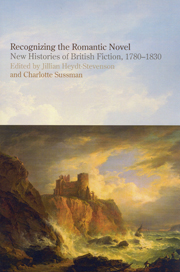Book contents
- Frontmatter
- Contents
- Acknowledgements
- Notes on Contributors
- Preface
- 1 ‘Launched Upon the Sea of Moral and Political Inquiry’: The Ethical Experiments of the Romantic Novel
- 2 Bad Marriages, Bad Novels: The ‘Philosophical Romance’
- 3 Enlightenment or Illumination: The Spectre of Conspiracy in Gothic Fictions of the 1790s
- 4 Burney's Conservatism: Masculine Value and ‘the Ingenuous Cecilia’
- 5 ‘All Agog to Find Her Out’: Compulsory Narration in The Wanderer
- 6 A Select Collection: Barbauld, Scott, and the Rise of the (Reprinted) Novel
- 7 Austen, Empire and Moral Virtue
- 8 Fanny Price's British Museum: Empire, Genre, and Memory in Mansfield Park
- 9 Between the Lines: Poetry, Persuasion, and the Feelings of the Past
- 10 Scholarly Revivals: Gothic Fiction, Secret History, and Hogg's Private Memoirs and Confessions of a Justified Sinner
- 11 Sympathy, Physiognomy, and Scottish Romantic Fiction
- Works Cited
- Index
9 - Between the Lines: Poetry, Persuasion, and the Feelings of the Past
- Frontmatter
- Contents
- Acknowledgements
- Notes on Contributors
- Preface
- 1 ‘Launched Upon the Sea of Moral and Political Inquiry’: The Ethical Experiments of the Romantic Novel
- 2 Bad Marriages, Bad Novels: The ‘Philosophical Romance’
- 3 Enlightenment or Illumination: The Spectre of Conspiracy in Gothic Fictions of the 1790s
- 4 Burney's Conservatism: Masculine Value and ‘the Ingenuous Cecilia’
- 5 ‘All Agog to Find Her Out’: Compulsory Narration in The Wanderer
- 6 A Select Collection: Barbauld, Scott, and the Rise of the (Reprinted) Novel
- 7 Austen, Empire and Moral Virtue
- 8 Fanny Price's British Museum: Empire, Genre, and Memory in Mansfield Park
- 9 Between the Lines: Poetry, Persuasion, and the Feelings of the Past
- 10 Scholarly Revivals: Gothic Fiction, Secret History, and Hogg's Private Memoirs and Confessions of a Justified Sinner
- 11 Sympathy, Physiognomy, and Scottish Romantic Fiction
- Works Cited
- Index
Summary
Walking, in town or country, is one of the devices used in Jane Austen's novels to depict intimacy, private reflection, or the possibility of transgressing – by however little – the boundaries of consciousness and polite social intercourse. The Romantic-era novel as Austen practises it admits transgression, in this sense, between the little sportive lines of a country hedgerow. In Persuasion (1815–16), overhearing is the other device used to render porous the estranged yet linked consciousness of the novel's two former lovers, Anne Elliot and Captain Frederick Wentworth. The effect of such devices is to create an interstitial space in which the minds and feelings of the characters can meet; it is this space that renders Persuasion the most Romantic and private of Austen's novels. Each of the former lovers is the survivor of an earlier, failed romance that has been marginalized and apparently forgotten. Their recovery of this earlier romance involves the recovery of shared memory. Just as the ‘revisit’ poem returns the Romantic poet, often in the company of a second self, to a recollected landscape, so Persuasion revisits a landscape of former feeling and finds it changed.
The most memorable scene of overhearing in Persuasion occurs at the end of the novel, in the famous revised chapter, when Captain Wentworth overhears Anne discussing the relative constancy of men and women.
- Type
- Chapter
- Information
- Recognizing the Romantic NovelNew Histories of British Fiction, 1780-1830, pp. 237 - 266Publisher: Liverpool University PressPrint publication year: 2010

